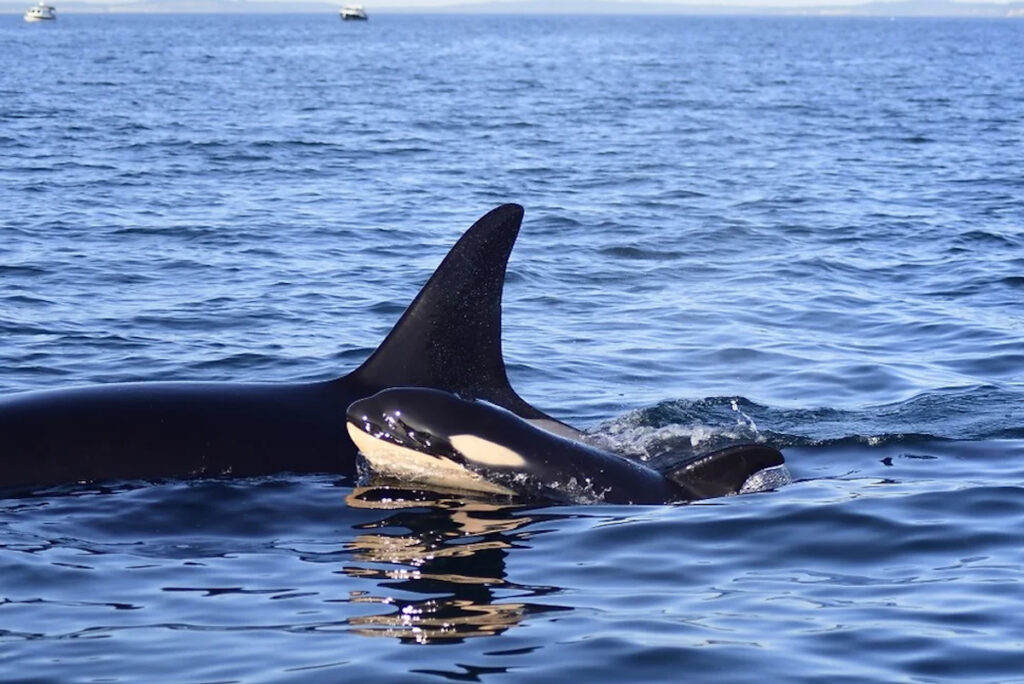Newborn Southern Resident Orca Whale Spotted in Puget Sound
4 min read
A new orca calf with J pod in Puget Sound, Washington on Dec. 26, 2022. Maya Sears NMFS Permit 27052
Founded in 2005 as an Ohio-based environmental newspaper, EcoWatch is a digital platform dedicated to publishing quality, science-based content on environmental issues, causes, and solutions.
A new baby orca whale was spotted recently in Washington State’s Puget Sound with the southern resident orca whales’ J pod, reported The Seattle Times. According to researchers, the calf is likely only a few days old.
Brad Hanson, a wildlife biologist with the National Oceanic and Atmospheric Administration, told The Seattle Times that the calf — known as J60 — was seen near President Point.
“It’s really, really good news,” Hanson said. “It also comes with the trepidation of how they’re going to fare throughout the first few years of their life.”
The calf was spotted near an adult female named Suttles — also known as J40 — who the Center for Whale Research said in a post on social media seemed most likely to be the mother.
“Maya Sears shared a viewfinder photo with Dave Ellifrit of the underside of J60. Dave was able to confirm that J60 is a boy! We can’t wait to see this new J Pod baby firsthand,” the Center for Whale Research said on their website.
According to Donna Sandstrom, founder and director of The Whale Trail, Suttles is a 19-year-old female, as King 5 News reported. If she is the mother, J60 would be her first calf.
“Mark said the calf looked really healthy. He said it looked like it was trying to tail-slap. It was practicing tail slapping, which is just, so wonderful,” Sandstrom said, according to King 5 News.
The endangered J pod’s first new calf since September of 2020 was born last year, a female known as J59.
According to Orca Conservancy data, the birth of J60 brings the southern resident orca population — which consists of the J, K and L pods — up to 77. It also increases the J pod to 26 members and means there are now 10 southern resident calves less than five years of age.
Southern resident orcas are affected by pollution, shrinking populations of the Chinook salmon they feed upon and boat noise. The underwater noise makes it more difficult for the whales to hunt and communicate, reported The Seattle Times.
New legislation that goes into effect next year will require recreational boats to keep three times the distance they are currently asked to maintain from the whales, King 5 News reported.
“I am a little concerned with a new calf and the population. People are very tempted to go get photos of that adorable baby. That’s the wrong thing to do. Give them 1,000 yards away, and give that baby and its mom a chance to survive,” Sandstrom said, as reported by King 5 News.
The southern resident orca population peaked in 1995 at 98 members before declining by nearly 20 percent by 2001, The Seattle Times reported.
Hanson said they weren’t having many calves, and some were not living long enough to reproduce.
“In order for the population to grow, you really need them to have five or six successful calves. And that’s just not been happening in the population,” Hanson said, as reported by The Seattle Times.
According to researchers, lack of food causes two-thirds of southern resident orca pregnancies to be unsuccessful.
More recent studies have determined that southern resident females do not have as much success hunting as populations farther north. They also found that not only have southern resident orca numbers been falling, but that the population has become more and more inbred and could be headed toward extinction.
“One of the problems this population has had, is some pods — especially K Pod — has had a hard time even getting pregnant, or having pregnancies come to fruition. So anytime there’s a successful birth of a calf, everyone rejoices,” Sandstrom said, as King 5 News reported.
Subscribe to get exclusive updates in our daily newsletter!
By signing up, you agree to the Terms of Use and Privacy Policy & to receive electronic communications from EcoWatch Media Group, which may include marketing promotions, advertisements and sponsored content.





